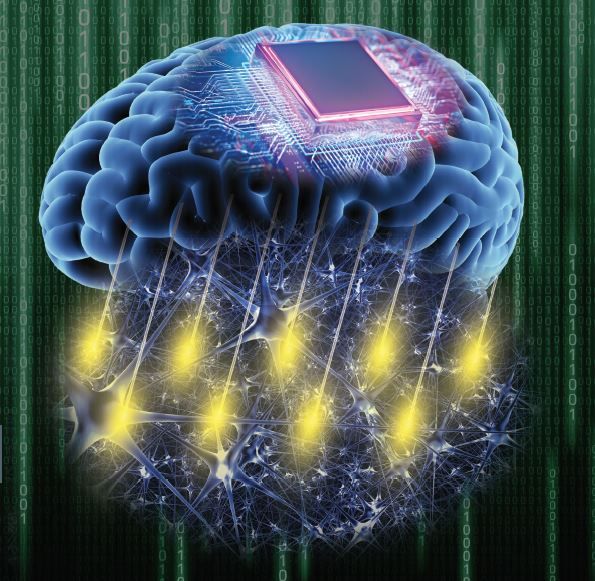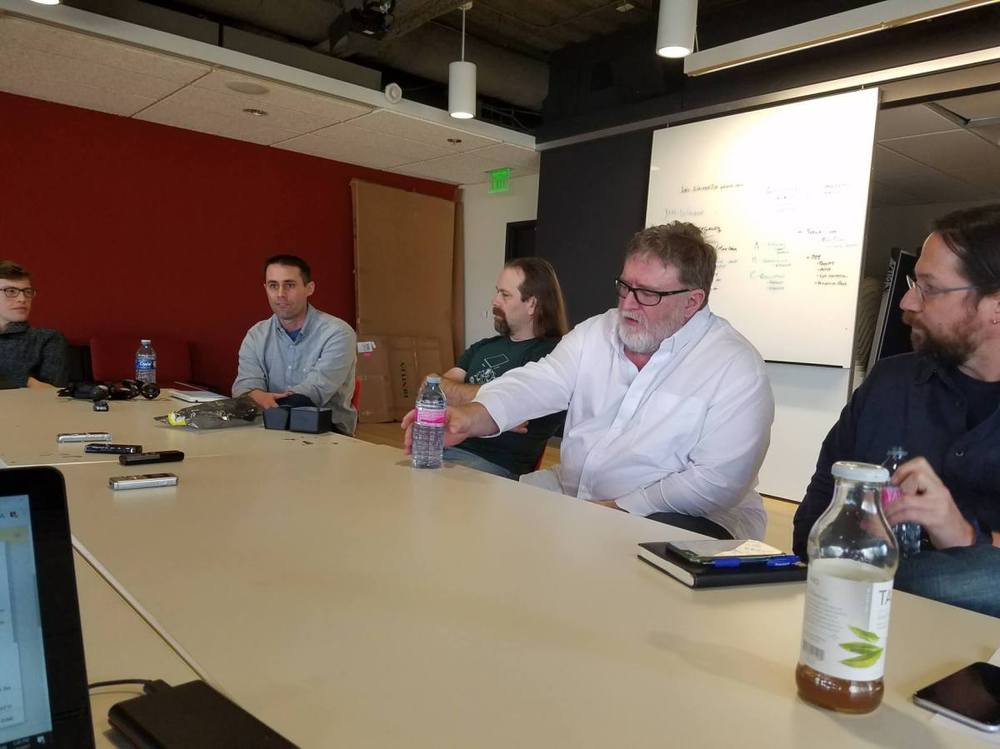Archive for the ‘neuroscience’ category: Page 586
Mar 24, 2020
New genetic editing powers discovered in squid
Posted by Shailesh Prasad in categories: biotech/medical, genetics, neuroscience
Revealing yet another super-power in the skillful squid, scientists have discovered that squid massively edit their own genetic instructions not only within the nucleus of their neurons, but also within the axon — the long, slender neural projections that transmit electrical impulses to other neurons. This is the first time that edits to genetic information have been observed outside of the nucleus of an animal cell.
The study, led by Isabel C. Vallecillo-Viejo and Joshua Rosenthal at the Marine Biological Laboratory (MBL), Woods Hole, is published this week in Nucleic Acids Research.
The discovery provides another jolt to the “central dogma” of molecular biology, which states that genetic information is passed faithfully from DNA to messenger RNA to the synthesis of proteins. In 2015, Rosenthal and colleagues discovered that squid “edit” their messenger RNA instructions to an extraordinary degree — orders of magnitude more than humans do — allowing them to fine-tune the type of proteins that will be produced in the nervous system.
Mar 24, 2020
This mind-reading chip will build a better prosthetic
Posted by Brent Ellman in categories: biotech/medical, computing, cyborgs, neuroscience
Mar 23, 2020
New brain reading technology could help the development of brainwave-controlled devices
Posted by Nicholi Avery in categories: biotech/medical, neuroscience
A new method to accurately record brain activity at scale has been developed by researchers at the Crick, Stanford University and UCL. The technique could lead to new medical devices to help amputees, people with paralysis or people with neurological conditions such as motor neurone disease.
The research in mice, published in Science Advances, developed an accurate and scalable method to record brain activity across large areas, including on the surface and in deeper regions simultaneously.
Mar 23, 2020
Secret of the ‘immortal’ hydra’s regenerating ability uncovered
Posted by Quinn Sena in categories: evolution, life extension, neuroscience
The hydra is named after the serpent monster from Greek myth, which regrows two heads each time one is cut off. But freshwater hydras have an even more impressive regenerating ability: an entire hydra can regrow from a small piece of tissue in only a few days.
Biologists are particularly excited by this ability, since many of the networks involved in the healing process developed early in the process of evolution, meaning that they are shared among many animals, including humans.
“In other organisms, like humans, once our brain is injured, we have difficulty recovering because the brain lacks the kind of regenerative abilities we see in hydra,” said researcher Abby Primack.
Mar 22, 2020
Bringing silicon computing power to the brain
Posted by Genevieve Klien in categories: computing, neuroscience
A new device enables researchers to observe hundreds of neurons in the brain in real-time. The system is based on modified silicon chips from cameras, but rather than taking a picture, it takes a movie of the neural electrical activity.
Mar 21, 2020
Valve president Gabe Newell: ‘We’re way closer to The Matrix than people realize’
Posted by Saúl Morales Rodriguéz in categories: computing, neuroscience, virtual reality
Think we’re far off from The Matrix? Gabe Newell says you should think again.
In a rare interview with IGN ahead of next week’s release of Half-Life: Alyx, Newell reasoned that more advanced forms of VR might not be too far out. “We’re way closer to The Matrix than people realize,” he stated. “It’s not going to be ‘The Matrix’, The Matrix is a movie and it misses all the interesting technical subtleties and just how weird the post-brain-computer interface world is going to be. But it’s going to have a huge impact on the kinds of experiences that we can create for people.”
Mar 20, 2020
Activation of the Anti-Aging and Cognition-Enhancing Gene Klotho
Posted by Quinn Sena in categories: biotech/medical, life extension, neuroscience
Multiple lines of evidence show that the anti-aging and cognition-enhancing protein Klotho fosters neuronal survival, increases the anti-oxidative stress defense, and promotes remyelination of demyelinated axons. Thus, upregulation of the Klotho gene can potentially alleviate the symptoms and/or prevent the progression of age-associated neurodegenerative diseases such as Alzheimer’s disease and demyelinating diseases such as multiple sclerosis. Here we used a CRISPR-dCas9 complex to investigate single-guide RNA (sgRNA) targeting the Klotho promoter region for efficient transcriptional activation of the Klotho gene. We tested the sgRNAs within the — 1 to — 300 bp of the Klotho promoter region and identified two sgRNAs that can effectively enhance Klotho gene transcription. We examined the transcriptional activation of the Klotho gene using three different systems: a Firefly luciferase (FLuc) and NanoLuc luciferase (NLuc) coincidence reporter system, a NLuc knock-in in Klotho 3’-UTR using CRISPR genomic editing, and two human cell lines: neuronal SY5Y cells and kidney HK-2 cells that express Klotho endogenously. The two sgRNAs enhanced Klotho expression at both the gene and protein levels. Our results show the feasibility of gene therapy for targeting Klotho using CRISPR technology. Enhancing Klotho levels has a therapeutic potential for increasing cognition and treating age-associated neurodegenerative, demyelinating and other diseases, such as chronic kidney disease and cancer.
Keywords: Alzheimer’s disease; Cancer; Chronic kidney disease; Multiple sclerosis; Myelin; Neuroprotection.
What does it take to think beyond the human? Can we imagine our human selves in other lives? And should we? While contemporary answers to these questions have highlighted the desirability and necessity of imagining ourselves as animals, plants, and even objects, others argue that such acts of the imagination are fundamentally flawed. The human, Lynn Festa argues in Fiction without Humanity, is really all we get access to.
The 21st century has seen the rise of what are often lumped together as a variety of “posthumanist” critical approaches: thing theory and “new materialism” (see Bill Brown’s Other Things and Jane Bennett’s Vibrant Matter), animal studies (see Jacques Derrida’s The Animal That Therefore I Am and Donna Haraway’s When Species Meet), and even a burgeoning plant studies (see Jeffrey T. Nealon’s Plant Theory: Biopower and Vegetable Life). Each of these approaches has asked us to broaden the range of what Miguel Tamen calls “interpretable objects” well beyond the human; to consider what forms of signification, consciousness, or meaning might belong to animals, plants, and objects.1
Mar 20, 2020
The Doctor Who Helped Defeat Smallpox Explains What’s Coming
Posted by Omuterema Akhahenda in categories: biotech/medical, health, neuroscience
In addition to working with the World Health Organization to end smallpox, Larry Brilliant has fought flu, polio, and blindness. He says we will, eventually, get back to normal. But that’s not going to occur until three important things happen first. LARRY BRILLIANT SAYS he doesn’t have a crystal ball. But 14 years ago, Brilliant, the epidemiologist who helped eradicate smallpox, spoke to a TED audience and described what the next pandemic would look like. At the time, it sounded almost too horrible to take seriously. “A billion people would get sick,” he said. “As many as 165 million people would die. There would be a global recession and depression, and the cost to our economy of $1 to $3 trillion would be far worse for everyone than merely 100 million people dying, because so many more people would lose their jobs and their health care benefits, that the consequences are almost unthinkable.”
Epidemiologist Larry Brilliant, who warned of pandemic in 2006, says we can beat the novel coronavirus—but first, we need lots more testing.

















